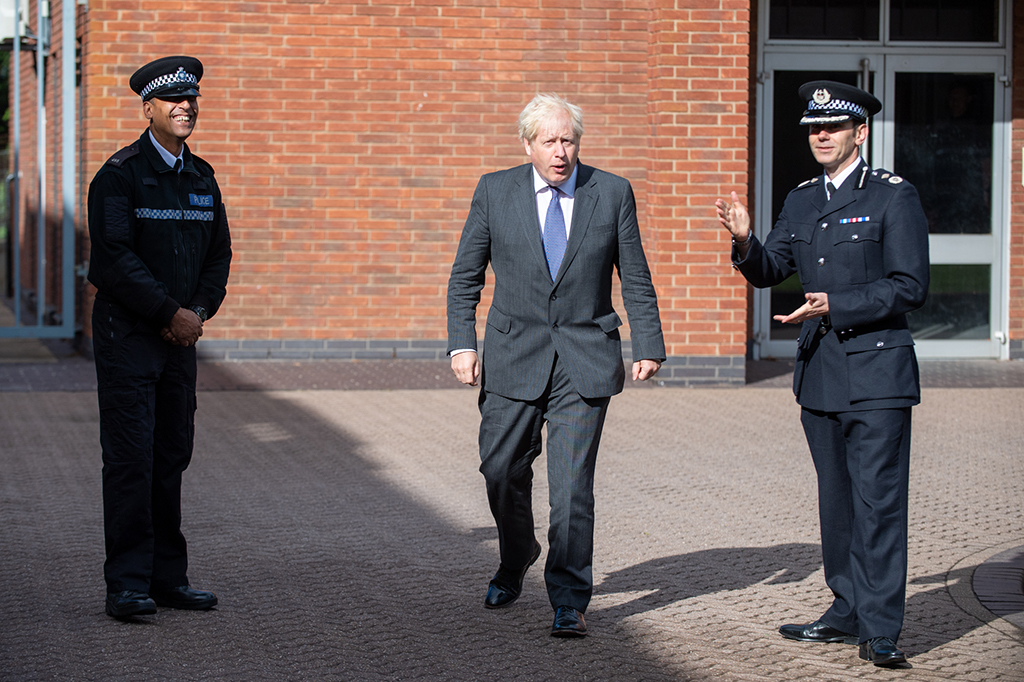
The Prime Minister’s visit was on the back of the Force’s success in recruiting new officers and he met a group of new recruits before seeing the new fleet of Police Interceptor cars which hit the road in September.
Stephen Mold said: “It was great the Prime Minister acknowledged how well we are doing with recruitment and that the Force has pushed ahead with numbers, so we are well on the way to meeting our targets.
“We had already pledged to recruit an additional 83 police officers using our local council tax funding and we were very fortunate to benefit from more than 190 extra officers funded through the Government’s uplift programme. This will take the Force to more than 1,500 officers by 2023 and make it the largest it has ever been.”
Mr Mold also took the opportunity to ask the Prime Minister to consider making domestic violence a key local priority.
“I told Mr Johnson that not one body has overall responsibility for domestic violence and asked him to look at how we can ensure the work done to support victims and deter offenders is properly coordinated across the country.”
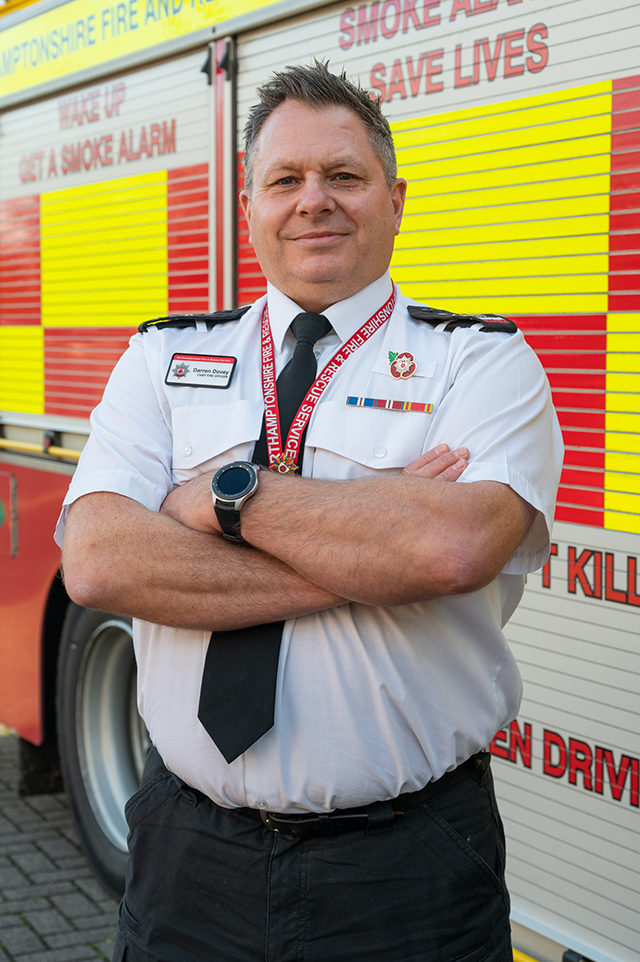
Northamptonshire PFCC Stephen Mold asked Darren to continue to steer Northamptonshire’s Fire and Rescue Service (NFRS) during this crucial time as the service responds to the ongoing pandemic and begins its performance improvement plan.
PFCC Stephen Mold said: “I believe that the county’s fire service needs continuity and Darren will ensure that the NFRS is able to continue to improve on the fantastic contribution it has made throughout the uncertainty of the pandemic and beyond.
“Darren and his team have turned around the performance of NFRS in the last year, making major improvements to the service the public receive.”
Darren was appointed Chief Fire Officer on 1 July 2016. He was born in London but has lived in Northampton since the age of 7, growing up and going to school in the Thorplands area. He joined Royal Berkshire Fire and Rescue in 1987 and transferred to London Fire Brigade in 1999, moving to Northamptonshire Fire and Rescue Service in 2008 as an area manager. During his career he worked on the fire at Windsor Castle and was at Russell Square as part of the response to the 07/07 bombings in London. In 2005, he was press liaison officer at the scene of a fatal house fire in Stoke Newington in which three people died.
Darren said: “I postponed my retirement so that I could see NFRS through the change of governance and use the opportunity this gave us to invest in the service and push forward with improvements for the first time in many years.
“Thanks to the hard work of every member of the team, NFRS is providing an even better service and I am confident that we are on our way towards excellence. The next challenge will be to make better use of technology and share more buildings and support services with Northamptonshire Police.”
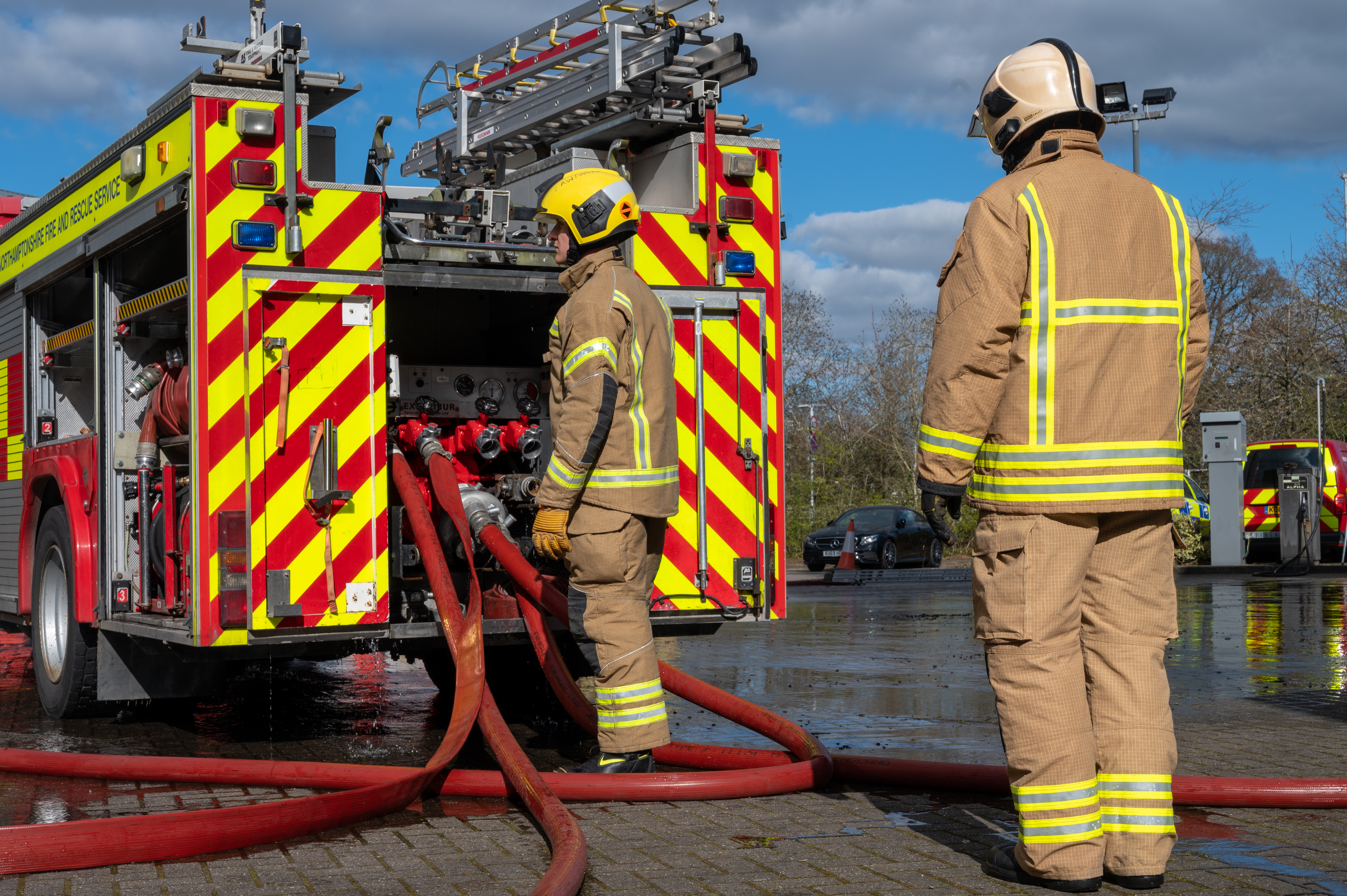
Northamptonshire Fire and Rescue Service is responding to calls for service more quickly than at any time in the last five years, with response times now averaging below ten minutes to fire incidents and road traffic collisions across the county.
The number of fire engines available to attend incidents has also improved significantly, with at least 14 pumps now available always, whereas last year 14 pumps were only available for 87% of the time.
The latest figures confirm the improvements highlighted by HMICFRS in a letter to the the Police, Fire and Crime Commissioner Stephen Mold and the Chief Fire Officer Darren Dovey.
The figures from the first quarter of the 2020/21 financial year, which includes the pandemic lockdown, show that:

Chief Fire Officer Darren Dovey commented: “With the Covid-19 pandemic, this year has been a tough one for all emergency services and the public. It has been so important for us to have the right people and resources in place to be able to offer our “business as usual” service, but also to go the extra mile and support partners in ways we haven’t done before, such as ambulance driving for East Midlands Ambulance Service.”
Stephen Mold, Northamptonshire Police, Fire and Crime Commissioner, said: “I’m proud to see the hard work the senior officers, firefighters and service as a whole have put into ensuring the safety provision for the county continues to improve.”
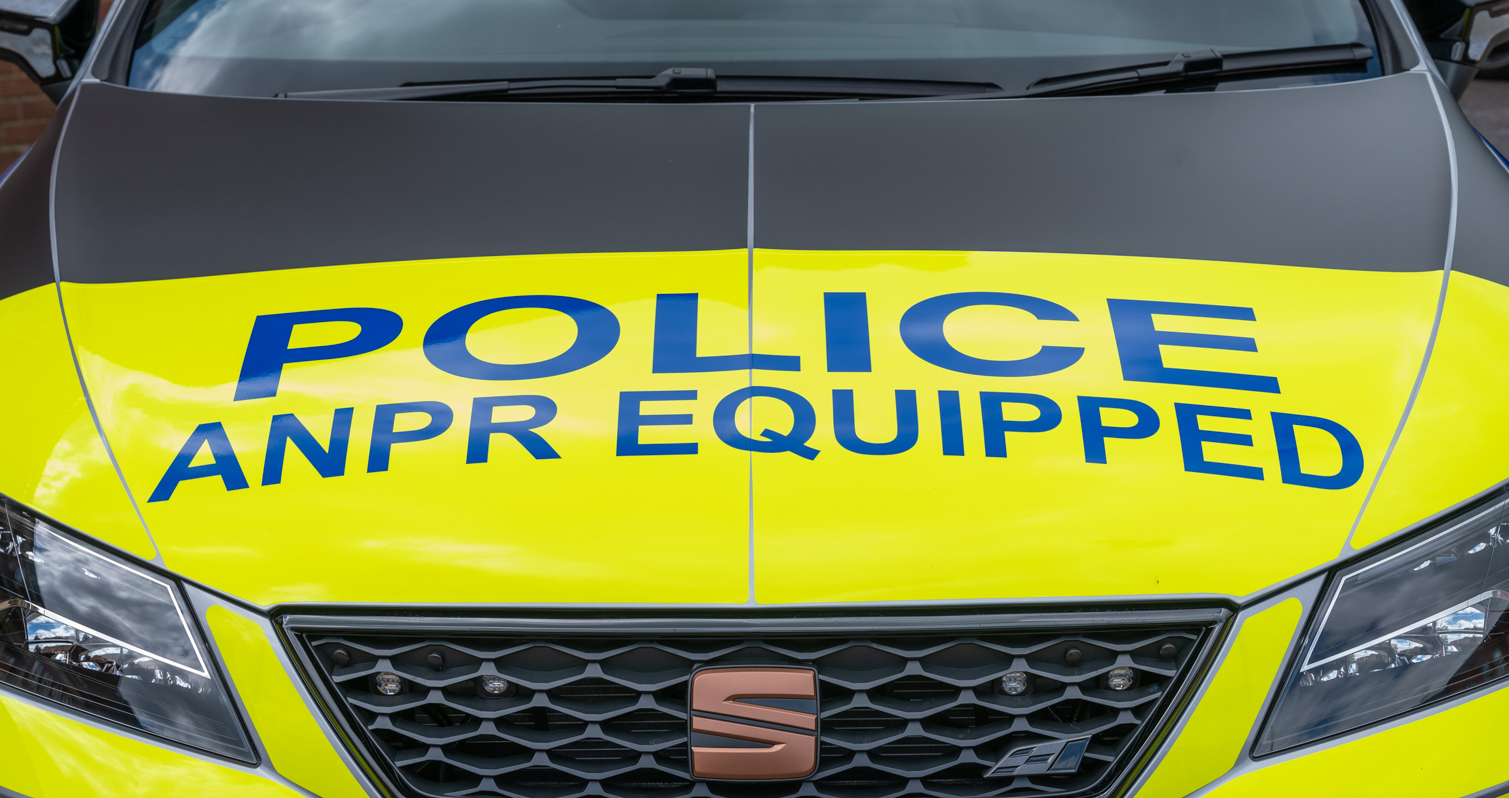
In a major, £1.3 million investment from the Police, Fire and Crime Commissioner Stephen Mold, significantly more than 100 new cameras, both fixed and mobile, will join the county’s existing network, strengthening the policing response and helping to make Northamptonshire a hostile place for criminals.
The new, fixed cameras are set to be installed on the major strategic routes and at the county borders, in rural communities and in major towns such as Northampton and Rushden.
The plan also includes between 10 and 15 mobile spike cameras that will be deployed according to operational need in areas where there is no fixed camera coverage. Mobile ANPR capacity in cars will also be significantly increased, supporting the Road Crime Team and the new rapid response interceptor fleet.
The ANPR investment will significantly strengthen the tools available to help the police fight crime and keep the county safe.
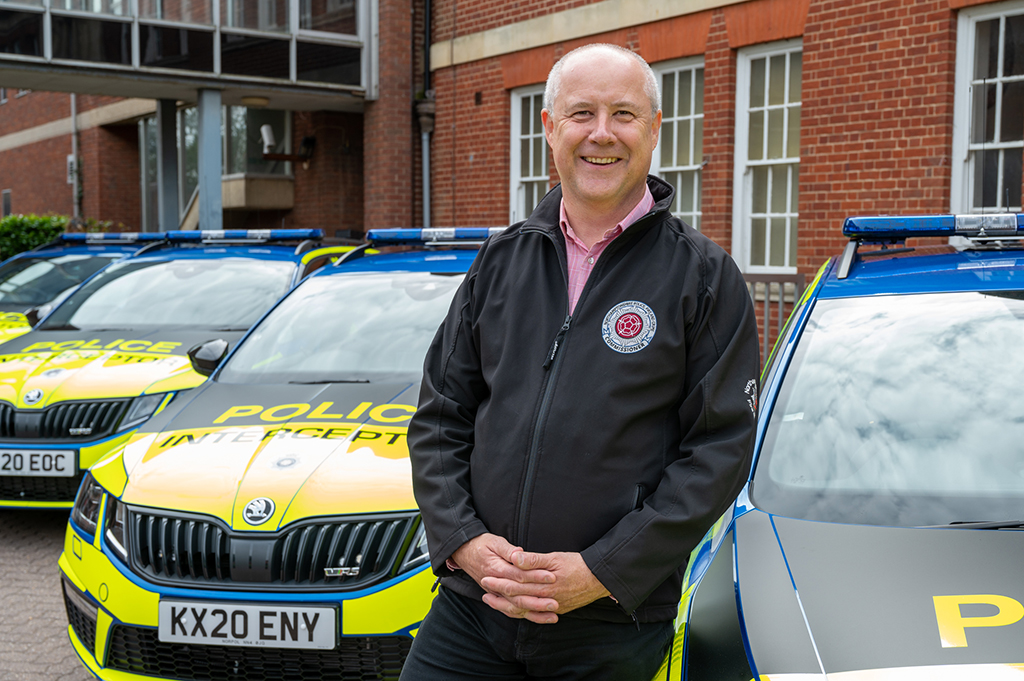
Police, Fire and Crime Commissioner Stephen Mold has invested around £300,000 in the new fleet, which is made up of eight Skoda Octavia VRS Estate TDi vehicles. Each have the capabilities of high-performance cars and have been fitted with latest technology and kit. The vehicles will be used by the Northamptonshire Police Interceptors Team, which is made up of highly trained Response officers across the Force. The vehicles will give officers the capabilities to intercept known vehicles and criminals and target hotspots to make the county’s roads safer.
Police, Fire & Crime Commissioner, Stephen Mold, said: “This is another major investment in policing in Northamptonshire, which gives officers more tools and capacity to respond robustly to those who use the county’s road network to commit crime. “Taken together with the increased number of police officers and our plans to enormously expand our ANPR network, these investments support the Force’s plans to crack down even harder on crime and will really benefit people across the county.”

Northamptonshire Fire and Rescue Service (NFRS) has bought 120 fire escape hoods, which can be placed over the heads of members of the public to help stop them from breathing in toxic gases and will be used in incidents where firefighters need to wear breathing apparatus.
The single-use lightweight hoods provide up to 15 minutes protection, reducing the exposure and making it less dangerous for the public when firefighters must lead them to safety through smoke-filled buildings.
These fluorescent, respirator devices will not be used in every fire, but will be deployed where appropriate to support rescues and evacuations.
Chief Fire Officer Darren Dovey said: “One of the challenges for firefighters in evacuating buildings is ensuring the public are as safe as possible, even when passing down staircases, through hallways or other areas filled with toxic smoke.
“These hoods are a welcome addition to our appliances as they really will provide a life-line and help the public, preventing them absorbing the gases and improving our chances of saving lives.”
Police, Fire and Crime Commissioner Stephen Mold said: “Many people don’t think about the huge risk that comes with smoke, but toxic fumes can have a devastating impact on a person’s ability to escape safely.
“I’m pleased to see these potentially life-saving hoods in service, giving firefighters another tool in their work to keep Northamptonshire safe.”

The Northamptonshire Neighbourhood Watch Association was awarded £9,500 for Operation Target, which aims to reduce crime and build stronger and safer communities in crime hot spot areas.
There are over 1,200 Neighbourhood Watch schemes in Northamptonshire, with over 40,000 members.
Alan Earle, Neighbourhood Watch Chairman, said: “We know that a well-run scheme with effective communication about concerns in the community, crime prevention information, and a good working relationship with the local Neighbourhood Policing Team has resulted in reducing crime by 30% in some areas.”
The Good Loaf was awarded just over £9,000 to deliver a 10-week project that aims to improve the wellbeing of vulnerable women while teaching baking skills and provide a toolkit to enhance their mental health. CEO of The Good Loaf, Suzy Van Rooyen said: “We are absolutely delighted to have been awarded these funds to make this group possible. Local vulnerable women may need this support more than ever during these difficult times and we are all very grateful to the Police, Fire and Crime Commissioner’s Office. It has not been an easy year for anyone, least of all for those who may have been affected by domestic abuse or addiction.”
Creating Equalz was also successful in its bid to the Commissioner’s Making Northamptonshire Safer fund, for just under £9,500. Training and resources will be provided to primary and secondary schools in the county, to help them identify additional risks that girls from practicing FGM communities will face during the Covid-19 pandemic.
Ashton Parish Council and Cottingham Parish Council were successful in their bids to the Commissioner’s Road Safety fund and will use the money to install speed control devices in areas of concern.

Since lockdown began, abuse cases within the home have nearly doubled in the county, with child-on-parent abuse – an often overlooked form of physical, emotional or financial control – having also seen increases.
Voice – which has been operational throughout lockdown – wants to break down barriers for those needing support and make people aware of new techniques that can help families.
The new support resource, available at voicenorthants.org/support, is being promoted county-wide across social media and in high-footfall locations, in order to ensure that families are aware of the support mechanisms available.
All support given by Voice is free, confidential and people don’t have to have reported any crime to the police.
CEO of Voice, Fiona Campbell, said: “Since lockdown began we’ve seen a sharp rise in domestic abuse cases within the county and we have been looking for new ways to support people beyond traditional methods.
“The Child-on-Parent Abuse app has been created to offer another branch of support to families and make people aware of new and innovative techniques being used where traditional approaches have failed.
“I’d like to reassure anyone who is in need of support that we’re here for them, whenever they’re ready. Our phonelines are open and we offer both telephone and online support to anyone who needs us.”
The Police, Fire and Crime Commissioner’s Youth Service celebrated national Youth Work Week and shared some of the work they have been involved in during 2020. Early support for young people is at the very heart of the Commissioner’s Police, Fire and Crime Plan for the county.
Since their launch in January, the team of 12 specialists have worked throughout the pandemic, to identify meaningful support for 2,221 young people.
The team has supported vulnerable young people in learning to keep safe, working with them on themes such as emotional well-being, positive and healthy relationships, gang awareness, knife crime and the impact of drugs and alcohol misuse.
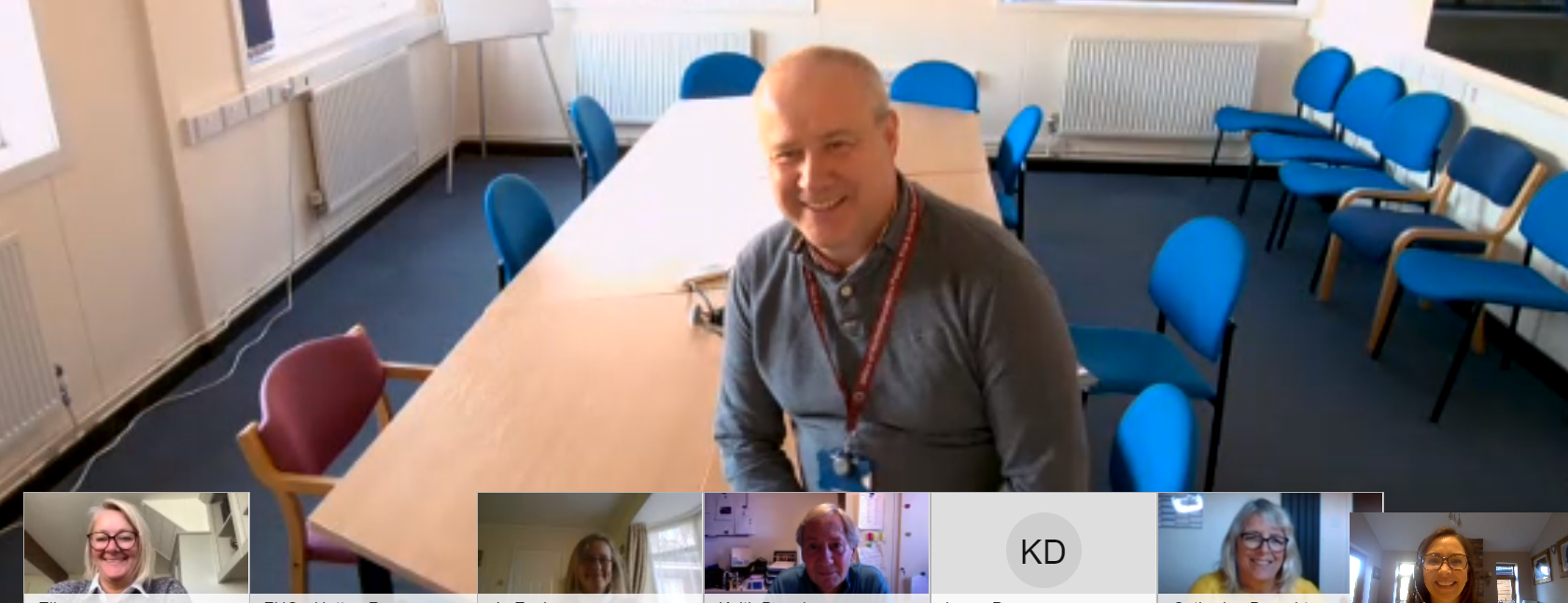
ICV volunteers are five months into a different way of working to ensure the vital scheme in Northamptonshire continues. Like many during the Covid-19 pandemic, they have turned to remote methods to carry out their role as safely as possible. After physical ICV visits were suspended to minimise the risk of spreading the virus, it was important to maintain a form of independent oversight of Police custody and a way of bringing an independent perspective to the custody process.
ICVs now call the Criminal Justice Centre in Northampton and the Weekley Woods Justice Centre in Kettering once a week to speak to people detained there over the phone. They ask about their wellbeing and ensure they have understood and received their rights and entitlements, with a focus on access to safeguards and support, as well as hygiene measures. Any issues raised are reported to the Custody Inspector and OPFCC.
Since June, ICV volunteers have spoken with 32 detainees over the phone and no serious concerns have been raised.
PFCC Stephen Mold said: “The ICV scheme is a statutory requirement and an important part of the work of the Office of the Police, Fire and Crime Commissioner. The team of volunteers provide public reassurance by assisting in the scrutiny of police performance.
“The ICVs that agreed to take on this new, temporary approach have adapted really well, and I am very thankful to those that are continuing to volunteer remotely so that independent checks can still take place during this challenging time.”
ICV Jo Espin reflects on the changes: “I agreed to do remote custody visits because I thought it could be a long time before we would be able to carry out visits in person, and meanwhile police custody would still see many people coming through its doors.
“Rapport and trust can be established much more quickly when meeting people in person. However, telephone visits are a useful tool for now. At a time when police methods in the UK and wider world are under scrutiny in the wake of different events, yet custody suites are behind closed doors even more than usual due to the pandemic restrictions, remote visits give detainees the opportunity to describe how they are being looked after, and to have issues raised and dealt with. It also allows us to acknowledge examples of good police practice.”